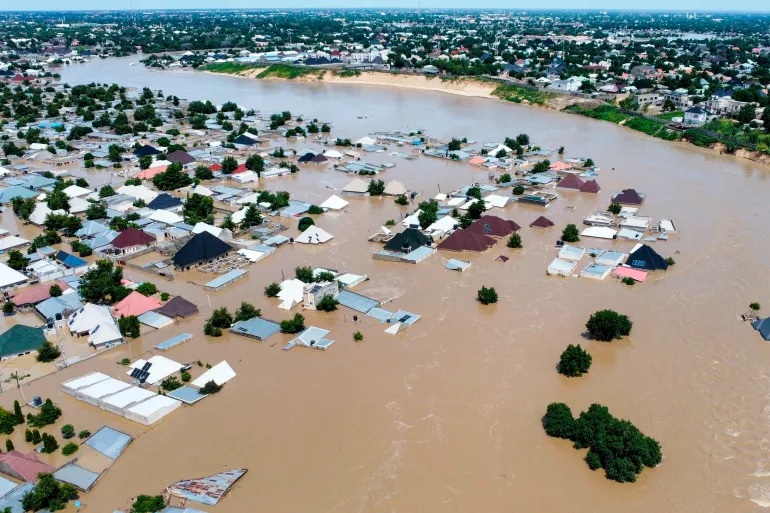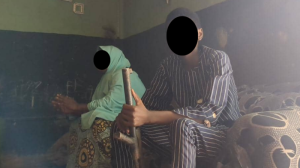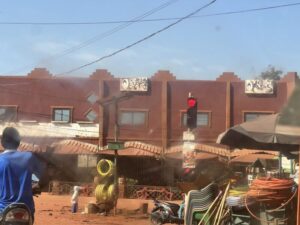In recent months, Borno and Yobe States have faced an unprecedented confluence of crises, pushing commodity prices to alarming levels. The government’s decision to cut subsidies has compounded the economic strain already felt from a prolonged insurgency that has destabilized the region for over a decade. Adding to the turmoil, devastating floods have ravaged infrastructure and disrupted supply chains, leaving communities struggling to access basic necessities.
This report delves into the intricate interplay of these factors, highlighting how the triple threat is reshaping the economic landscape and exacerbating the suffering of residents in these beleaguered states.
Since the removal of the fuel subsidy by President Bola Ahmed Tinubu in May 2023, the cost of essential commodities, particularly food items, has seen a noticeable increase across the country. In Maiduguri, the capital of Borno State, residents have observed these rising prices with growing concern, although expressing their concerns with the hope that things will get better and livelihoods affordable with the current state government’s interventions.
Over the years, Borno State has faced significant socioeconomic and humanitarian challenges due to the Boko Haram insurgency, which has not only affected the security of the state but also its economic conditions. The ongoing conflict has contributed to making food items in the state relatively more expensive compared to other parts of Nigeria. In recent months, however, the escalation in prices has become more pronounced, largely attributed to the recent turnaround Federal Government’s economic policies.
Now couple with the recent flood disaster witness in Maiduguri and Jere communities have further exacerbated the situation.
Flood Devastates Business in Borno State
The recent flooding in Borno State has severely disrupted business activities, leaving the region in a state of economic paralysis. Key markets, such as Gamburu and Maiduguri’s Monday Market, have been hit hard. Monday Market, already recovering from a fire last year, now faces further setbacks that threaten its role as a critical trading hub.
The damage to infrastructure is significant, with buildings at risk of collapse and roads washed away. This destruction has led to substantial financial losses for local traders and businesses, which are essential for the community’s economic health.
Moreover, the flood has caused a food crisis in Maiduguri, dramatically increasing prices for basic necessities. Traders report that a bag of rice has skyrocketed to ₦150,000, and one spaghetti is now selling for ₦2,000. The lack of access to goods is making life increasingly difficult for residents, compounding the hardship caused by the flooding.
Experts warn that the long-term economic effects could be severe, depending on how policymakers respond. It is crucial to balance reconstruction efforts with support for local businesses and assistance for those most affected by the disaster. Without immediate action, the flood’s impact could linger for years to come, further straining the economy and the community.
Oil Production in Nigeria
Ahmed Ali Gaji, a resident of Maiduguri, remarked that the subsidy removal has undoubtedly played a role in the recent spike in food prices. He noted that while the Federal Government’s decision was aimed at economic restructuring, it has inadvertently led to a strain on the livelihoods of many, particularly in a state already grappling with significant social and economic challenges.
Another local, Abubakar Sadiq, pointed to the devaluation of the Naira as a key driver of the inflation being experienced. He explained that if the national currency had retained more value, the impact of such policies might have been less severe. “The weaker Naira means higher costs for imported goods, and this trickles down to the average consumer,” he said, urging traders to show compassion and consider the prevailing hardships.
In Damaturu, the headquarters of neighbouring Yobe State, the effects of the rising prices are similarly felt, but residents there observe a slight difference when compared to Maiduguri. “The cost of basic items like rice, groundnut and beans is somewhat lower here in Damaturu than in Maiduguri,” said Halima Musa, a consumer from Nayinawa area in Damaturu. “However, the situation is still difficult, and we are feeling the pressure too.”
Adding to her voice, Ibrahim Garba, another consumer, noted, “Although Damaturu’s markets are not as heavily impacted as those in Maiduguri, we cannot ignore that prices are still on the rise. The difference is minor, but noticeable.”
Meanwhile, in Maiduguri, Farouq Ibrahim emphasised that while the subsidy removal is a factor, the behaviour of certain traders exacerbates the situation. “There are those who take advantage of the situation to inflate prices unnecessarily,” he said, appealing for fairness and empathy towards the common people.
In response to the rising concerns, a trader in Maiduguri, who requested anonymity, commended the efforts of the Borno State government under the leadership of Professor Baba Gana Umara Zulum. “The government has been proactive in seeking sustainable solutions to alleviate the burden on the people. Initiatives such as subsidised fertilizer and food items distribution as well as support for small businesses have made a difference,” he remarked.

Boko Haram insurgency
Similarly, Musa Kachallah, a consumer in Maiduguri, expressed appreciation for the state government’s efforts. “The situation could have been worse if not for the interventions by the government. Professor Zulum has shown that he understands the struggles of the people, and his policies are evidence of that commitment,” he said.
However, not all are in agreement with the extent of these interventions. Usman Shariff Jidda, an economist based in Maiduguri, warned that without more comprehensive measures, the state might continue to face difficulties. He highlighted the importance of bolstering agricultural productivity and improving the transportation infrastructure, which are essential to stabilising food prices in the region.
Jidda concluded by urging the government to explore more tailored solutions that address the unique challenges faced by states like Borno. “Our policies must be context-specific, recognising the impact of both insurgency and economic shifts on our local economy,” he advised.
As the people of Maiduguri and surrounding areas navigate these challenging times, there is a collective hope that with prudent measures and a spirit of cooperation among all stakeholders, the hardships can be mitigated, and more stable economic conditions achieved.



